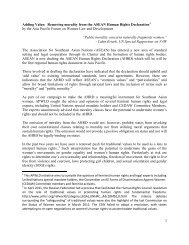A Digest of Case Law on the Human Rights of Women - Asia Pacific ...
A Digest of Case Law on the Human Rights of Women - Asia Pacific ...
A Digest of Case Law on the Human Rights of Women - Asia Pacific ...
You also want an ePaper? Increase the reach of your titles
YUMPU automatically turns print PDFs into web optimized ePapers that Google loves.
Prakash Mani Sharma v His Majesty’s Government, Ministry <str<strong>on</strong>g>of</str<strong>on</strong>g> <str<strong>on</strong>g>Law</str<strong>on</strong>g>, Justice etc. (Nepal)<br />
granted to every<strong>on</strong>e all <strong>the</strong> time. The resp<strong>on</strong>dents also argued that <strong>the</strong> law did not<br />
discriminate against women because a wife <str<strong>on</strong>g>of</str<strong>on</strong>g> <strong>the</strong> deceased pers<strong>on</strong> could inherit a<br />
tenancy.<br />
The resp<strong>on</strong>dents argued that precedent supported <strong>the</strong>ir positi<strong>on</strong>. They also argued<br />
that a general law like <strong>the</strong> C<strong>on</strong>stituti<strong>on</strong> could not be used to interpret a specific law<br />
such as <strong>the</strong> Act Relating to Land.<br />
Decisi<strong>on</strong><br />
The Court held that secti<strong>on</strong> 26(1) was lawful. The Court recognised that <strong>the</strong>re were<br />
inc<strong>on</strong>sistencies between <strong>the</strong> Act Relating to Land and <strong>the</strong> C<strong>on</strong>stituti<strong>on</strong>, but <strong>the</strong>se<br />
must be seen in light <str<strong>on</strong>g>of</str<strong>on</strong>g> <strong>the</strong> fact that <strong>the</strong> right to tenancy is not an absolute right, but<br />
a c<strong>on</strong>diti<strong>on</strong>al <strong>on</strong>e. The Court accepted <strong>the</strong> argument that since a wife may inherit <strong>the</strong><br />
tenancy, <strong>the</strong> law did not discriminate based <strong>on</strong> gender. The Court ruled that secti<strong>on</strong><br />
26(1) was c<strong>on</strong>sistent with <strong>the</strong> principle <str<strong>on</strong>g>of</str<strong>on</strong>g> equality guaranteed in <strong>the</strong> C<strong>on</strong>stituti<strong>on</strong>.<br />
Fur<strong>the</strong>r, <strong>the</strong> Court stated that it was reas<strong>on</strong>able to exclude daughters and daughters-inlaw<br />
from inheriting tenancy because this ensured <strong>the</strong> smooth functi<strong>on</strong>ing <str<strong>on</strong>g>of</str<strong>on</strong>g> land after<br />
<strong>the</strong> death <str<strong>on</strong>g>of</str<strong>on</strong>g> a tenant. A daughter was likely to become a member <str<strong>on</strong>g>of</str<strong>on</strong>g> her husband’s<br />
family, and if she inherited a tenancy, <strong>the</strong> tenancy would leave <strong>the</strong> original family and<br />
disrupt <strong>the</strong>ir use <str<strong>on</strong>g>of</str<strong>on</strong>g> <strong>the</strong> land. The Court also stated that daughters were in different<br />
situati<strong>on</strong>s to s<strong>on</strong>s because <strong>the</strong>y were entitled to inherit from <strong>the</strong>ir husbands.<br />
The Court directed <strong>the</strong> government to study <strong>the</strong> issues fur<strong>the</strong>r and examine <strong>the</strong><br />
possibility <str<strong>on</strong>g>of</str<strong>on</strong>g> new legislati<strong>on</strong> to deal with <strong>the</strong> issues raised in this case.<br />
Commentary<br />
This case was not positive for Nepalese women. The Supreme Court refused to<br />
recognise that tenancy laws discriminated against women and in doing so reinforced<br />
traditi<strong>on</strong>al roles and stereotypes <str<strong>on</strong>g>of</str<strong>on</strong>g> Nepalese women. The Court took <strong>the</strong> view that<br />
to give women <strong>the</strong> same rights as men in tenancy law would provide an additi<strong>on</strong>al<br />
privilege to daughters who would receive a “double share” <str<strong>on</strong>g>of</str<strong>on</strong>g> property as <strong>the</strong>y would<br />
also inherit through <strong>the</strong>ir husbands. This viewpoint masked <strong>the</strong> truth <str<strong>on</strong>g>of</str<strong>on</strong>g> women’s<br />
relative ec<strong>on</strong>omic weakness.<br />
80



